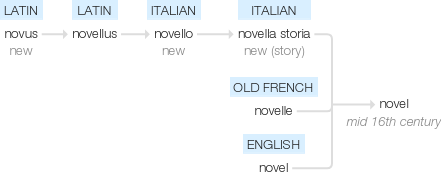Novel
mid 16th century: from Italian novella (storia) ‘new (story)’, feminine of novello ‘new’, from Latin novellus, from novus ‘new’. The word is also found from late Middle English until the 18th century in the sense ‘a novelty, a piece of news’, from Old French novelle (see novel2).
wiktionary
From Middle English novel, from Old French novel(“new, fresh, recent, recently made or done, strange, rare”) (modern nouvel, nouveau), from Latin novellus(“new, fresh, young, modern”), diminutive of novus(“new”). Doublet of nouveau.
Borrowed from Italian novella, from Latin novella, feminine of novellus. Doublet of novella
From Middle English novel, from Old French novelle, from Latin novella, feminine of novellus.
Borrowed from Latin novella, feminine of novellus.
etymonline
novel (adj.)
"new, strange, unusual, previously unknown," mid-15c., but little used before 1600, from Old French novel, nouvel "new, young, fresh, recent; additional; early, soon" (Modern French nouveau, fem. nouvelle), from Latin novellus "new, young, recent," diminutive of novus "new" (see new).
novel (n.)
"fictitious prose narrative," 1560s, from Italian novella "short story," originally "new story, news," from Latin novella "new things" (source of French novelle, French nouvelle), neuter plural or fem. of novellus "new, young, recent," diminutive of novus "new" (see new). Originally "one of the tales or short stories in a collection" (especially Boccaccio's), later (1630s) "long prose fiction narrative or tale," a type of work which had before that been called a romance.
A novel is like a violin bow; the box which gives off the sounds is the soul of the reader. [Stendhal, "Life of Henri Brulard"]
The word was used earlier in English in the now-obsolete senses "a novelty, something new," and, in plural, "news, tidings" (mid-15c.), both from Old French novelle.
